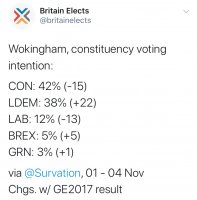That gets exactly to what I was on about in every respect.

As you said, it's a case of 'what are the scenarios to avoid a tory majority' and, just as important, which ones can be pursued as an overt and achievable political strategy by Labour. And then if Labour if Labour do try and drag in some tactical Libdem/remainy votes, the risks they take in terms of the impact of those messages on Labour Leave minded voters elsewhere...
The irony is, if Labour did pull this off - and by pull it off that only means avoid a tory majority - it would actually be a victory for their timid constructive ambiguity policy that I along with many others on here have been highly critical of.

As you said, it's a case of 'what are the scenarios to avoid a tory majority' and, just as important, which ones can be pursued as an overt and achievable political strategy by Labour. And then if Labour if Labour do try and drag in some tactical Libdem/remainy votes, the risks they take in terms of the impact of those messages on Labour Leave minded voters elsewhere...






